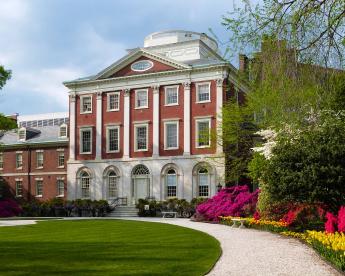
History: Philadelphia and the Quaker Colonies
Philadelphia and the Quaker Colonies
- Benjamin Franklin
A collection of Benjamin Franklin tidbits that relate Philadelphia's revolutionary prelate to his moving around the city, the colonies, and the world.
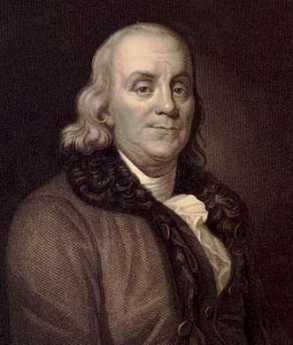
- Bystanders to the Revolution It wasn't heroic to everyone.
- Causes of the American Revolution Britain and its colonies had outgrown Eighteenth Century techniques of governance. Unfortunately, both England and America lacked the sophistication to make drastic changes smoothly.
- Connecticut Invades Pennsylvania! Connecticut once waged three serious wars with Pennsylvania, and we don't even remember it. But politicians noticed that all became peaceful after we united into a single nation. Others noticed the Articles of Confederation were strong enough to cope with invasions by neighbor states. The two proprietorships of New Jersey taught some smaller lessons. Virginia taught still other lessons.
- Curtis To Cy Curtis, magazines were just vehicles for advertisers. In fact, his mags taught former farmers how to manage urban life, more or less accidentally creating a focus for American books, authors, politics and literature. The fall of his empire teaches the lesson that antitrust laws against vertical integration are probably unnecessary.
- Foreign Affairs This topic is under construction. Feel free to watch it evolve.
- George Washington in Philadelphia Philadelphia remains slightly miffed that Washington was so enthusiastic about moving the nation's capital next to his home on the Potomac. The fact remains that the era of Washington's eminence was Philadelphia's era; for thirty years Washington and Philadelphia dominated affairs.
- Government Organization Government Organization
- In Memoriam
Charles Peterson
Lewis B, Flinn, M.D.Wilton A. Doane,MD Henry Cadbury
Martin Orne, MD, PhDGeorge W. Gowen, MD Kenneth Gordon, MD
Mary Stuart Fisher, MDOrville P. Horwitz,MD Lewis Harlow van Dusen, Jr.
Hobart Reiman, MD. Lindley B. Reagan, M.D.
Allan v. Heely Frederick Mason Jones, Jr.
Russell Roth,MD George Willoughby
Earle B. Twitchell Jonathan Evans Rhoads, Sr.
Garfield G. Duncan,MD
Hastings Griffin
Joseph P. Nicholson
Howard LewisAl DriscollHenry Bockus, MD
Mary Dunn
William H. Taylor
Abraham Rosenthal
- Japan and Philadelphia Philadelphia and Japan have had a special friendship for 150 years.
- Nobel Prizes Some Philadelphians won Nobel Prizes for work done here, or elsewhere. Some prize winners would deny they are Philadelphians, but their work was nevertheless done here.
- Pacifist Pennsylvania, Invaded Many Times Pennsylvania was founded as a pacifist utopia, and currently regards itself as protected by vast oceans. But Pennsylvania has been seriously invaded at least six times.
- Philadelphia Physicians Philadelphia dominated the medical profession so long that it's hard to distinguish between local traditions and national ones. The distinctive feature is that in Philadelphia you must be a real doctor before you become a mere specialist.
- Pre-Revolutionary Philadelphia .
- Quakers: All Alike, All Different Quaker doctrines emerge from the stories they tell about each other.
- Railroad Town
 It's generally agreed, railroads failed to adjust their fixed capacity to changing demands. It's less certain Philadelphia was pulled down by that collapsing rail system.
It's generally agreed, railroads failed to adjust their fixed capacity to changing demands. It's less certain Philadelphia was pulled down by that collapsing rail system.
- Revolutionary Philadelphia's Loyalists History is written by the victors, so the Tory Loyalists of Revolutionary Philadelphia have mostly fallen from view.
- Revolutionary Philadelphia's Patriots All kinds of people were patriots in 1776, and many of them were all mixed up about what was going on and how they stood. Hotheads in the London Coffee House stirred up about an inoffensive Tea Act, Scotch-Irish come here to escape the British Crown, the local artisan class and the local smuggler class, unexpectedly prospering under non-importation, and the local gentry -- offended to be denied seats in Parliament like other Englishmen. Pennsylvania wavered until Ben Franklin stepped forward with a plan.
- Shaping the Constitution in Philadelphia After Independence, the weakness of the Federal government dismayed a band of ardent patriots, so under Washington's leadership a stronger Constitution was written. Almost immediately, comrades discovered they had wanted the same thing for different reasons, so during the formative period they struggled to reshape future directions . Moving the Capitol from Philadelphia to the Potomac proved curiously central to all this.
- The British Attack Philadelphia Fighting in the Revolutionary War lasted eight years; for two years (June 1776 to June 1778) Philadelphia was the main military objective of the British.
- ..The Constitution Our Constitution was not a proclamation written by a convention. It was a negotiated contract for uniting thirteen sovereign independent states. Nothing like that had ever been done voluntarily, and few nations have matched it in two hundred years, even with the use of force.
- Confederation Congress, 1781-1789 New topic 2012-08-06 12:22:08 description
- Sixth and Walnut
over to Broad and Sansom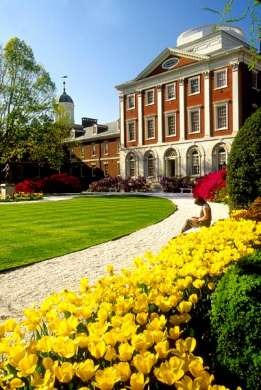 In 1751, the Pennsylvania Hospital at 8th and Spruce was 'way out in the country. Now it is in the center of a city, but the area still remains dominated by medical institutions.
In 1751, the Pennsylvania Hospital at 8th and Spruce was 'way out in the country. Now it is in the center of a city, but the area still remains dominated by medical institutions.
- Northern Overland Escape Path of the Philadelphia Tories 1 of 1 (16)
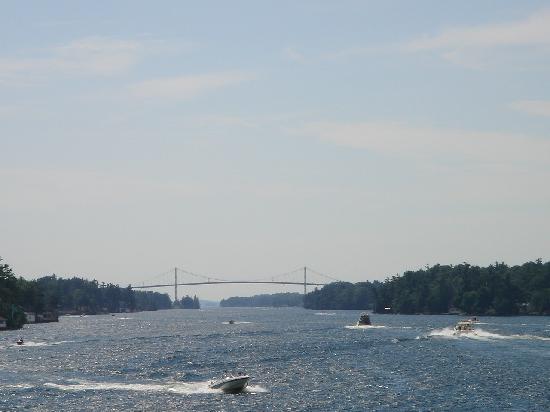 Grievances provoking the American Revolutionary War left many Philadelphians unprovoked. Loyalists often fled to Canada, especially Kingston, Ontario. Decades later the flow of dissidents reversed, Canadian anti-royalists taking refuge south of the border.
Grievances provoking the American Revolutionary War left many Philadelphians unprovoked. Loyalists often fled to Canada, especially Kingston, Ontario. Decades later the flow of dissidents reversed, Canadian anti-royalists taking refuge south of the border.
- Slavery and Quakerism Quakers wanted to free their own slaves peacefully; Bostonians wanted to abolish slavery, punish slaveholders.
- Quakers: William Penn Although Ben Franklin gets more ink lately, William Penn deserves at least equal rank among the most remarkable men who ever lived.
- Charter of Pennsylvania, from Charles II to William Penn William Penn suggested what he wanted, and the Royal bureaucracy suggested suitable modifications of the gift. The resulting charter is a shrewd and fair legal document, but contained a major geographical error.
- Philadelphia Legal Scene The American legal profession grew up in this town, creating institutions and traditions that set the style for everyone else. Boston, New York and Washington have lots of influential lawyers, but Philadelphia shapes the legal profession.
- Quakers and Government
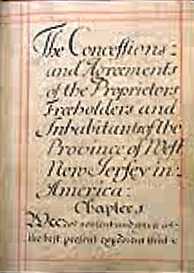
- Quaker Gardens New topic 2016-12-04 04:23:55 description
- Quakers: The Society of Friends According to an old Quaker joke, the Holy Trinity consists of the fatherhood of God, the brotherhood of man, and the neighborhood of Philadelphia.
- Education in Philadelphia Taxes are too high, but the tax base is too small, so public education is underfunded. Drug use and lack of classroom discipline are also problems. Business and employed persons have fled the city, must be induced to return. Deteriorating education, rising taxes and crime are the immediate problems, but the underlying issue is lack of vigor and engagement by the urban population itself.
- Historical Preservation The 20% federal tax credit for historic preservation is said to have been the special pet of Senator Lugar of Indiana. Much of the recent transformation of Philadelphia's downtown is attributed to this incentive.
- Quaker Values and Service New topic 2016-12-03 20:19:53 description
- Architecture in Philadelphia
Originating in a limitless forest, wooden structures became a "Red City" of brick after a few fires. Then a succession of gifted architects shaped the city as Greek Revival, then French. Modern architecture now responds as much to population sociology as artistic genius. Take a look at the current "green building" movement.
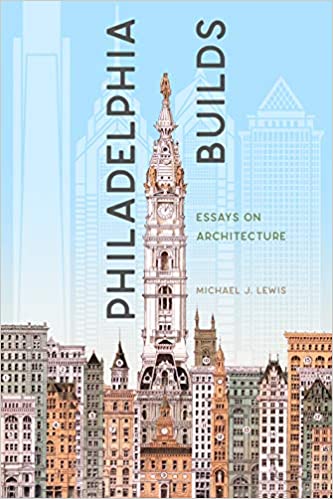
- Historical Motor Excursion North of Philadelphia The narrow waist of New Jersey was the upper border of William Penn's vast land holdings, and the outer edge of Quaker influence. In 1776-77, Lord Howe made this strip the main highway of his attempt to subjugate the Colonies.
- North of Market The term once referred to the Quaker district along Arch Street, and then to a larger district that had its heyday after the Civil War, industrialized, declined, and is now our worst urban problem area.
- Arch Street: from Sixth to Second When the large meeting house at Fourth and Arch was built, many Quakers moved their houses to the area. At that time, "North of Market" implied the Quaker region of town.
- Philadelphia Places New topic 2017-02-06 20:19:14 description
- Colonial Philadelphia (Pre- 1776)
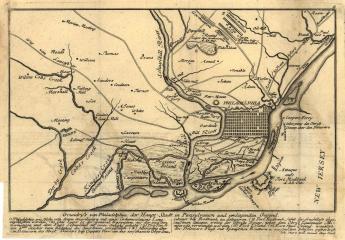 It's surprising to most Americans to learn the American Revolution was not the beginning, but almost half-way through the European settlement. And before the Revolution, there were thousands of years of settlement by non-European tribes. We know more about non-European settlers than we did fifty years ago, but records are still very poor or non-existent, and not likely to catch up very rapidly. History will begin in 1492 for a very long time. Long before that, it isn't history, it's anthropology.
It's surprising to most Americans to learn the American Revolution was not the beginning, but almost half-way through the European settlement. And before the Revolution, there were thousands of years of settlement by non-European tribes. We know more about non-European settlers than we did fifty years ago, but records are still very poor or non-existent, and not likely to catch up very rapidly. History will begin in 1492 for a very long time. Long before that, it isn't history, it's anthropology.
- Albany Conference 1754 New topic 2014-02-03 02:18:03 description
- Particular Sights to See:Center City Taxi drivers tell tourists that Center City is a "shining city on a hill". During the Industrial Era, the city almost urbanized out to the county line, and then retreated. Right now, the urban center is surrounded by a semi-deserted ring of former factories.
- Wister-Wistar Wistar-Wister
- The Park and Beyond: East Falls, Germantown, Mt. Airy and Chestnut Hill Fairmount Park is large enough to split the City from its suburbs, and is partly a playground, partly a museum. East Falls, Germantown and Chestnut Hill are almost a separate world on the far side of the park.